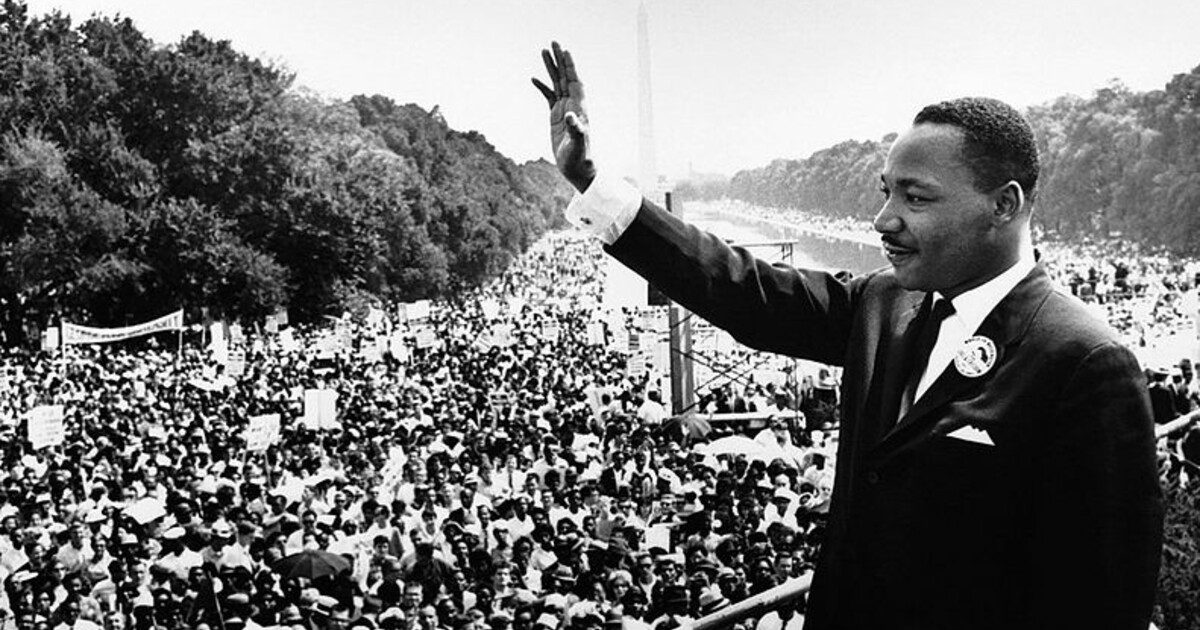Martin Luther King must be remembered for his belief in our collective ability to rise against injustice

An enduring memory from my teenage years was hearing for the first time, in documentaries to mark the twentieth anniversary of his assassination, some of the speeches of Martin Luther King. Now, as we mark the fiftieth anniversary, his words have lost none of their searing power.
Some clips from King’s speeches have become so famous that few people would hesitate to recognise them. But anyone who has only ever heard short extracts is missing out. To hear these speeches in full is to gain an insight not only into the burning injustice of his age, but also into the power of hope. King’s speeches often named the proponents of racial injustice and discrimination, but didn’t merely whip up righteous anger toward them. Instead he spoke to his audiences, people who had endured generations of brutality and were enduring it still, with the affirming confidence of someone who knew that such evil would lose, and that a better world would indeed be built.
When I listened to those speeches as a teenager, I cried. When I listen to them today I still cry. Today’s tears are not only for the injustices of history, but also for the paucity of progress made in the half century since he spoke.
The US itself is still a profoundly troubled society in relation to race and racism. The far right has grown in confidence over recent years, emboldened to see white supremacy given such explicit protection even by a President, but it is absolutely not a new phenomenon. Such hateful attitudes were never defeated, despite the achievements of the Civil Rights movement, and indeed those who hold them were never far from power.
Though blatant racial discrimination in voting was in theory abolished before King’s murder, few people at the time would have believed the prevalence of voter suppression techniques in practice today. The disenfranchisement of ex-offenders alone has a hugely disproportionate impact on black people, as the recent case of Crystal Mason underlines. Not even having been told she would lose her right to vote while on probation, she was sentenced to five years in prison by a Texan court for voting in the 2016 Presidential election.
Evidence continues to pile up, decade after decade, of racial inequality and discrimination in the wider criminal justice system, with the US sending a far higher proportion of black people than white into the prison system.
And the violence people live with, from racist mass-murder such as the Charleston church shooting to the daily threats that people face across the country highlight, as shown by the Black Lives Matter movement, that the US appears to place very different value on the lives of people from different racial groups. The wave of hate crime and hateful language directed at immigrants, asylum seekers, Muslims and other groups here at home reminds us that this is by no means a US-only problem.
While King’s legacy is praised by politicians across the spectrum, it’s important to remember that some of those same people would have been his bitter opponents at the time. Because his radical voice was raised not only against racial injustice, but also against poverty, exploitation and war. He sought not only civil rights for black Americans, but an economic Bill of Rights to combat the wider injustice of poverty, and he was prepared to use the same techniques of civil disobedience in that cause.
His reason for going to Memphis a few days before his death was to support striking workers, at a time when organised labour activism was treated with contempt by many in government. He understood quite clearly the racism that accompanied the exploitation of poor workers, but his response to it was a call for people of all races to unite in the fight against poverty and to create a society free from economic as well as racial injustice. He made the case for a citizens’ income as a foundation for this more equal society, an argument which now, decades later, is starting to gain ground.
Martin Luther King conveyed a passionate belief not only that a better society was needed, not only that it was urgent, but that it was actually coming. That we were capable of building this better society where it was everyone’s business to take on injustice, not only when they were affected themselves but when they saw it imposed against their neighbour too.
As a teenager, his words moved me. But I imagined at the time they were a matter of history. Listen to those words now, and you are listening to something still profoundly relevant; a powerful voice against injustices which burn still in our world today. We must try, however hard, to remember his belief in our collective ability to rise against these injustices, and to overcome.
This article first appeared in The National
